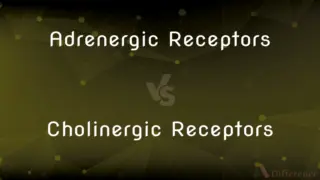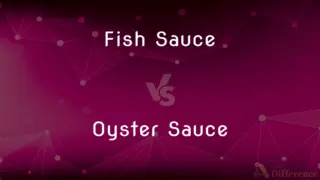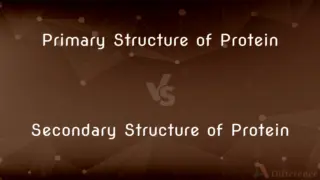Steer vs. Stir — What's the Difference?
Edited by Tayyaba Rehman — By Maham Liaqat — Updated on February 26, 2024
Steer involves guiding or controlling direction, especially in vehicles or ships, while stir means to mix or move something, often in a circular motion.

Difference Between Steer and Stir
Table of Contents
ADVERTISEMENT
Key Differences
Steer is primarily used in the context of controlling the course of a vehicle or vessel. It implies the act of directing towards a specific destination or along a particular path. Stir, on the other hand, is often associated with a physical movement within a substance, causing it to move or mix.
Steering requires a deliberate action or effort to guide something, such as using a wheel, handle, or other mechanisms. It is crucial for navigation and safety in transportation. Stirring involves a tool or device, like a spoon or stick, to agitate or mix contents within a container, crucial in cooking or mixing substances.
The concept of steering can extend metaphorically to situations where one influences the direction or outcome of events or decisions. Stirring, beyond its literal meaning, can also imply causing excitement, emotion, or agitation among people or situations.
Both actions require an agent: someone or something that performs the action. Steering is typically an intentional, focused effort to achieve a specific course, while stirring is more about creating a homogeneous mixture or inciting a reaction.
Steering is often associated with larger-scale, goal-oriented tasks (navigating a ship, driving a car), stirring is generally more about detail-oriented tasks (mixing ingredients, arousing emotions). Both, however, are about influencing or changing the current state towards a desired outcome.
ADVERTISEMENT
Comparison Chart
Definition
To guide the direction of something.
To mix or move something in a circular motion.
Context
Navigation, transportation, leadership.
Cooking, mixing substances, causing emotional agitation.
Tools/Means
Steering wheel, rudder, joystick, guidance.
Spoon, stick, whisk, agitation.
Purpose/Outcome
Achieve a specific direction or destination.
Achieve homogeneity, incite reaction, mix ingredients.
Metaphorical Use
Influencing the course of events or decisions.
Arousing emotions, initiating activity or agitation.
Compare with Definitions
Steer
To direct the path of something.
He steered the drone over the scenic landscape.
Stir
To mix ingredients by moving a utensil in a circular motion.
Stir the soup until it's evenly heated.
Steer
To control the direction of a vehicle or vessel.
She learned to steer the boat with confidence.
Stir
To move or to be moved slightly.
Not a leaf stirred in the windless day.
Steer
To navigate towards a destination.
They steered the ship through the narrow canal.
Stir
To disturb or agitate.
The sudden noise stirred the sleeping dog.
Steer
Guide or control the movement of (a vehicle, vessel, or aircraft), for example by turning a wheel or operating a rudder
He steered the boat slowly towards the busy quay
He let Lily steer
Stir
To awaken interest or attention.
The announcement stirred excitement among fans.
Steer
To guide someone's actions or decisions.
He steered the conversation away from controversial topics.
Stir
To cause or provoke a reaction or emotion.
The movie stirred a lot of controversy.
Steer
To influence the course of events.
She steered the project towards success despite challenges.
Stir
Move a spoon or other implement round in (a liquid or other substance) in order to mix it thoroughly
Pour in the cream and stir well
Desmond stirred his tea and ate a biscuit
Steer
The type of steering of a vehicle
Some cars boast four-wheel steer
Stir
Move or cause to move slightly
Nothing stirred except the wind
A gentle breeze stirred the leaves
Cloudiness is caused by the fish stirring up mud
Steer
A piece of advice or information concerning the development of a situation
The need for the NHS to be given a clear steer as to its future direction
Stir
Arouse strong feeling in (someone); move or excite
He stirred up the sweating crowd
They will be stirred to action by what is written
Steer
Another term for bullock
Stir
A slight physical movement
I stood, straining eyes and ears for the faintest stir
Steer
To set and follow (a course)
Steered a path around the rocks.
Stir
A commotion
The event caused quite a stir
Steer
To advise or direct (a person) toward a place or course of action
Steered the intern toward a career in sales.
Stir
An act of stirring food or drink
He gives his Ovaltine a stir
Steer
To guide a vessel or vehicle.
Stir
To pass an implement through (a liquid, for example), usually in circular motions, so as to mix or cool the contents
Stirred the soup before tasting it.
Steer
To follow or move in a set course.
Stir
To use an implement to move or rearrange the fuel in (a fire) to increase light or heat.
Steer
To admit of being steered or guided
A craft that steers easily.
Stir
To add or mix in (an ingredient, for example) into a liquid or mixture by moving an implement
Stirred a cup of sugar into the cake batter.
Steer
A piece of advice
The salesman gave me a bum steer on that new car.
Stir
To mix together the ingredients of (a liquid, for example) before cooking or use by moving an implement
Stirred up some popover batter.
Stirred the paint.
Steer
(intransitive) To guide the course of a vessel, vehicle, aircraft etc. (by means of a device such as a rudder, paddle, or steering wheel).
The boat steered towards the iceberg.
I steered homeward.
Stir
To move or pass (an implement) through a liquid in order to mix or cool the contents
Stirred her spoon in her coffee.
Steer
(transitive) To guide the course of a vessel, vehicle, aircraft etc. (by means of a device such as a rudder, paddle, or steering wheel).
I find it very difficult to steer a skateboard.
When planning the boat trip, we had completely forgotten that we needed somebody to steer.
Stir
To cause to move or shift, especially slightly or with irregular motion
A breeze stirred the branches.
Steer
(intransitive) To be directed and governed; to take a direction, or course; to obey the helm.
The boat steers easily.
Stir
To cause to become active; bestir
Stirred themselves to fix breakfast.
Steer
Be a guiding force, as with directions or advice;
The teacher steered the gifted students towards the more challenging courses
Stir
To excite strong feelings in or rouse, as from indifference
The speaker stirred us to volunteer at the homeless shelter.
Stir
To provoke deliberately; incite. Often used with up
Stir up trouble.
Stir
To change position slightly
The leaves were stirring in the breeze.
Stir
To start to move, especially in rising from sleep
The house was quiet, as no one had stirred yet.
Stir
To move about actively or busily
People were stirring about the office.
Stir
To move away from a customary or usual place or position
Instructed the guards not to stir from their posts.
Stir
To stir or mix a liquid or mixture
Stood at the counter stirring.
Stir
To be capable of being stirred
A mixture that stirs easily.
Stir
To happen or begin
When the civil rights movement first stirred.
Stir
To become the object of notice; to be on foot.
They fancy they have a right to talk freely upon everything that stirs or appears.
Stir
To rise, or be up, in the morning.
Stir
Emotional agitation and excitement
Stir
Move an implement through with a circular motion;
Stir the soup
Stir my drink
Stir
Stir feelings in;
Stimulate my appetite
Excite the audience
Stir emotions
Stir
Stir the feelings, emotions, or peace of;
These stories shook the community
The civil war shook the country
Stir
To begin moving,
As the thunder started the sleeping children began to stir
Stir
Mix or add by stirring;
Stir nuts into the dough
Common Curiosities
What does it mean to steer a conversation?
Guiding the topic or direction of a conversation towards specific subjects or outcomes.
Is steering only applicable to vehicles?
No, it can also refer to guiding or influencing decisions, actions, or directions in general.
Can stir be used in a metaphorical sense?
Yes, it can imply provoking emotions, thoughts, or reactions in a non-physical context.
What tools are commonly used for stirring?
Spoons, sticks, whisks, and other utensils designed for mixing.
How do steer and stir differ in purpose?
Steer is about controlling direction towards a goal, while stir is about mixing or agitating.
Can both terms be used metaphorically?
Yes, both can extend beyond their literal meanings to describe influencing or changing situations.
Why is stirring important in cooking?
It helps to combine ingredients evenly and can affect the texture and taste of food.
What skills are important for steering a vehicle?
Concentration, spatial awareness, and understanding of the vehicle's controls.
Is it possible to steer emotions?
Yes, through influencing or guiding the emotional state or reaction of oneself or others.
Can stirring be a passive action?
No, stirring requires active movement to mix or agitate.
What is the importance of steering in leadership?
It involves guiding or influencing a group or organization towards achieving its goals.
How do steer and stir relate to change?
Steer is about directing change, while stir is about initiating or mixing elements of change.
What does it mean to stir up trouble?
To cause or provoke disturbance, conflict, or agitation intentionally.
Are there automatic tools for stirring?
Yes, there are mechanical or electric devices designed to stir automatically in various contexts.
How does steering affect navigation?
It's essential for accurately following a planned route or reaching a destination.
Share Your Discovery

Previous Comparison
Part vs. Component
Next Comparison
Subvert vs. DivertAuthor Spotlight
Written by
Maham LiaqatEdited by
Tayyaba RehmanTayyaba Rehman is a distinguished writer, currently serving as a primary contributor to askdifference.com. As a researcher in semantics and etymology, Tayyaba's passion for the complexity of languages and their distinctions has found a perfect home on the platform. Tayyaba delves into the intricacies of language, distinguishing between commonly confused words and phrases, thereby providing clarity for readers worldwide.















































